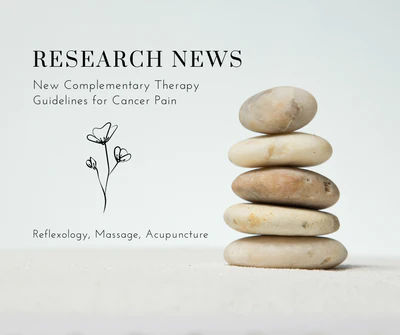
Exciting News for Complementary Therapies!
New Guidelines have been published recommending Reflexology, Massage, Acupuncture and other complementary therapies to people who have pain while receiving systemic therapy for cancer.
First, what is Complementary Therapy?
A complementary therapy means you can use it alongside your conventional medical treatment. It may help you to feel better and cope better with your treatment.

Pain is one of the most common symptoms reported by people diagnosed with cancer. Pain is the result of inflammation or damage to nerves, tissues, or other parts of the body.
Pain is a clinical challenge for many oncology patients and clinicians, and there’s a growing body of evidence showing that integrative therapies can be useful in pain management. There has not been clear clinical guidance about when and when not to use these approaches.
The American Society of Clinical Oncology (ASCO) and the Society for Integrative Oncology (SIO) developed the new guidelines to help doctors safely and effectively use complementary therapies to treat cancer pain.
These guidelines were published September 19, 2022, by the Journal of Clinical Oncology aimed to provide evidence-based recommendations to practicing physicians and other health care providers on integrative approaches to managing pain in patients with cancer.
THE RESULTS
Literature research identified 227 relevant studies as evidence for these new guidelines.

THE RECOMMENDATIONS
- Doctors may recommend reflexology or acupressure to people who have pain while receiving systemic therapy for cancer. Chemotherapy, hormonal therapy, targeted therapy, and immunotherapy are considered systemic therapy because they affect the whole body by going through the bloodstream.
- Doctors may recommend acupuncture, reflexology, or acupressure to people experiencing peripheral neuropathy related to cancer treatment.
- Massage may be offered to patients experiencing chronic pain after they complete breast cancer treatment.
- Massage may be offered to patients experiencing pain during palliative and hospice care.
WHAT THIS MEANS FOR YOU
If you’re in pain because of cancer treatment, you may want to show your doctor these guidelines and talk about complementary techniques that may be right for you.
If you or someone you know has pain from cancer treatment and is interested in learning more about Complementary Therapies, let us help. We offer a range of Complementary Therapies and Services for your peace of mind.
Give us a call 716-631-1516 or visit us online.
